When monitoring SEO visibility, it is important to contextualize lists of winners by analyzing what happened to the losing domains as well. Throughout 2020, there were a variety of factors that caused visibility declines, but not all of them were the result of a poorly executed SEO strategy or any other intentional action on the part of the website owner.
In some cases, adjustments to Google’s algorithms resulted in big changes to website visibility. Google rolled out 3 broad core algorithm updates in 2020, in addition to the thousands of smaller updates it made throughout the year. To add to that, the coronavirus pandemic resulted in massive shifts in organic search visibility as Google’s algorithms aimed to surface the most authoritative and trustworthy content, especially related to public health and safety.
Below are several categories of the types of visibility declines that took place among the losing domains.
| Domain | 30.12.2019 | 28.12.2020 | Change in % |
|---|---|---|---|
| thewirecutter.com | 26.50 | 0.01 | -99.96% |
| homeaway.com | 6.37 | 0.03 | -99.60% |
| spanishcentral.com | 6.15 | 0.03 | -99.50% |
| verizonwireless.com | 21.51 | 0.73 | -96.62% |
| ebags.com | 6.32 | 0.27 | -95.69% |
| freemusicdownloads.world | 5.79 | 0.28 | -95.22% |
| governmentjobs.com | 12.36 | 0.78 | -93.73% |
| peoplefinders.com | 5.08 | 0.32 | -93.63% |
| burlington.com | 14.85 | 1.07 | -92.81% |
| banggood.com | 6.41 | 0.69 | -89.27% |
| hostingfacts.com | 5.30 | 0.63 | -88.18% |
| peoplefinder.com | 5.71 | 0.72 | -87.36% |
| debt.org | 8.92 | 1.17 | -86.86% |
| dhgate.com | 7.91 | 1.07 | -86.43% |
| hackernoon.com | 5.94 | 0.83 | -86.02% |
| emedicinehealth.com | 20.18 | 3.08 | -84.76% |
| thedailybeast.com | 13.49 | 2.28 | -83.11% |
| flickr.com | 13.25 | 2.41 | -81.79% |
| heavy.com | 5.10 | 0.95 | -81.43% |
| kiloo.com | 13.75 | 2.57 | -81.30% |
To see the full list of 250 domains, click the link. There you’ll find the (unfiltered) list of all losers: View 250 percent losers in a Google Sheet.
News Sites
Several of the biggest news publishers in the U.S. made the list of domains losing significant SEO visibility in 2020, and the trend appears to be true in other countries as well.
Some of the most notable news publications in the U.S. were among the losers, such as The New York Times (-41.03), The Guardian (-89.48), Washington Post (-43.02), the Wall Street Journal (-27.19) and more..
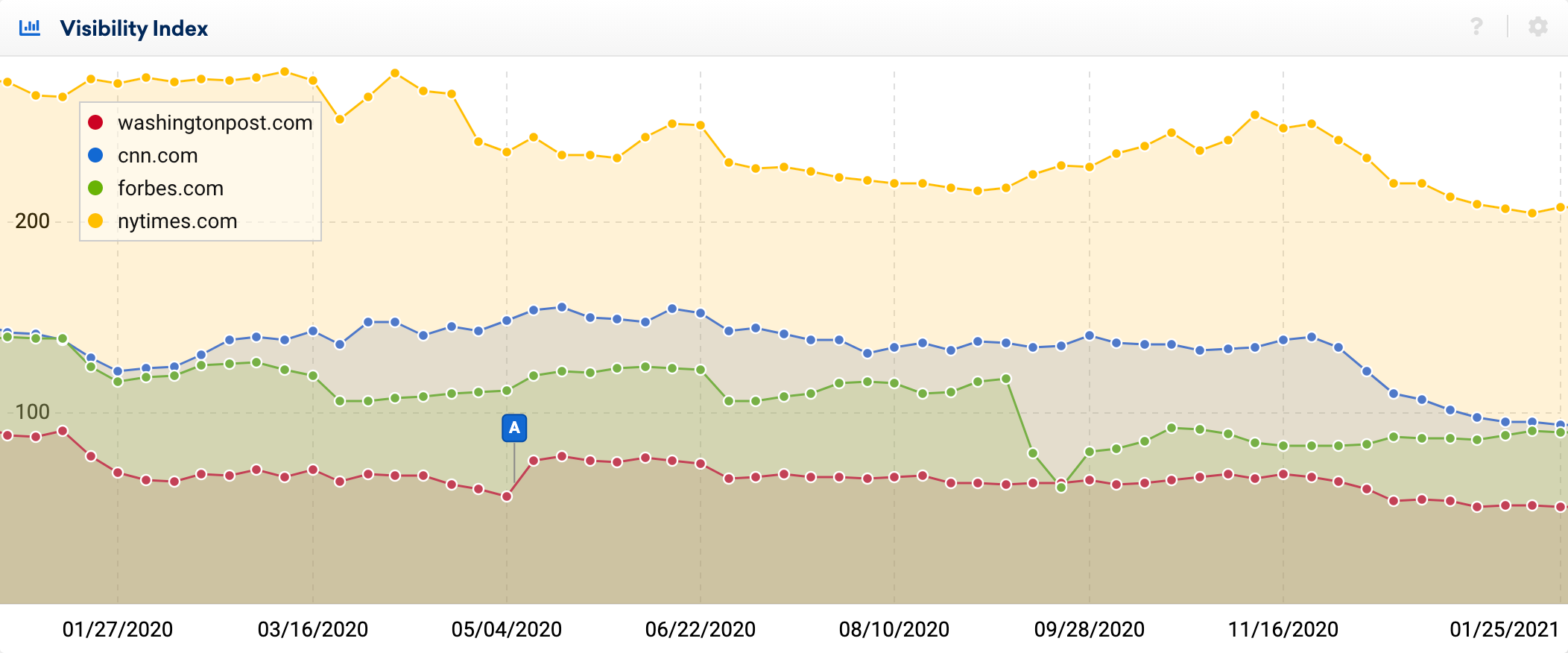
Looking at changes to individual rankings over the course of the year reveals some trends about the drops in visibility. As an example, The New York Times saw declines for many keywords where Google appears to have adjusted the intent of the results to no longer include news results. Below are a few examples.
For the query “Aetna,” a New York Times article was ranking position 4 in January 2020, but at the end of the year, there were no news results ranking on page 1 for this query.
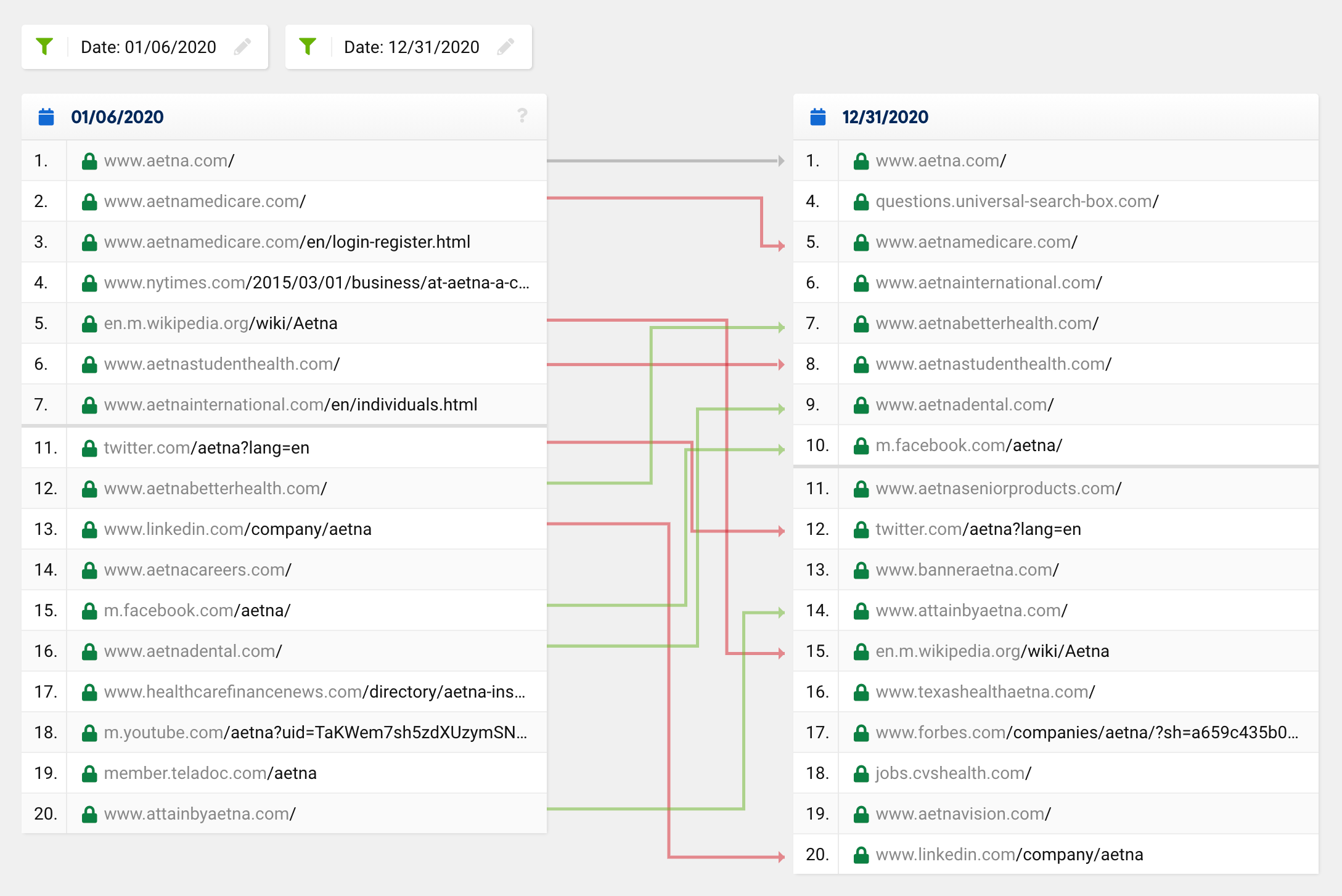
For the query “Wegmans,” the New York Times was also ranking on page 1 with an article about the grocery store at the beginning of 2020. By the end of the year, the article was no longer on the first page, but a few other developments took place. A ‘People Also Ask’ box took top positions, the company’s Twitter profile moved onto page 1, and a page from the FDA also began to rank.
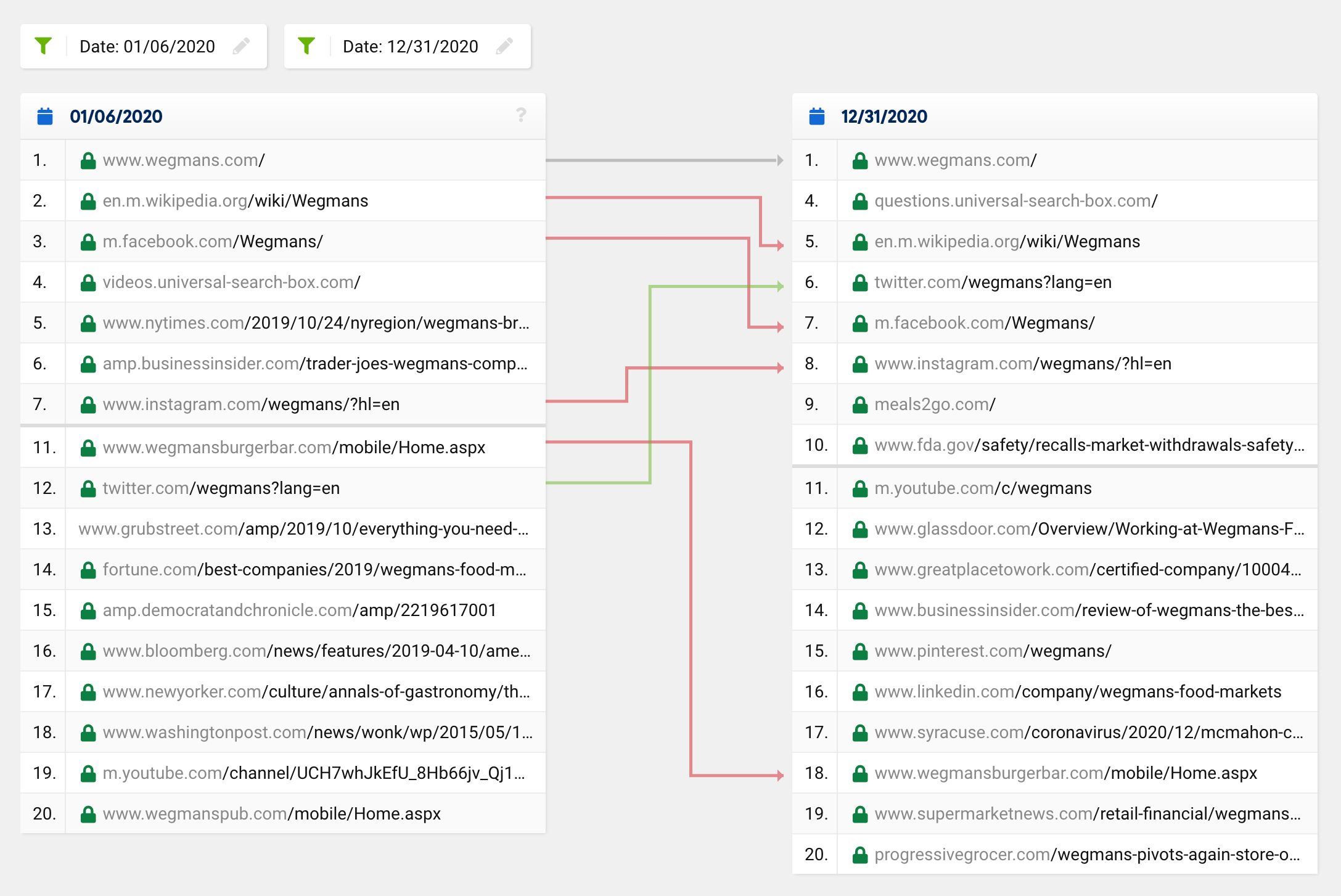
For the query “Supreme Court,” Google also appears to have eliminated news articles from the top organic positions by the end of 2020, while .gov and .org sites saw big increases, which is consistent with other patterns we have seen with those types of sites in 2020.
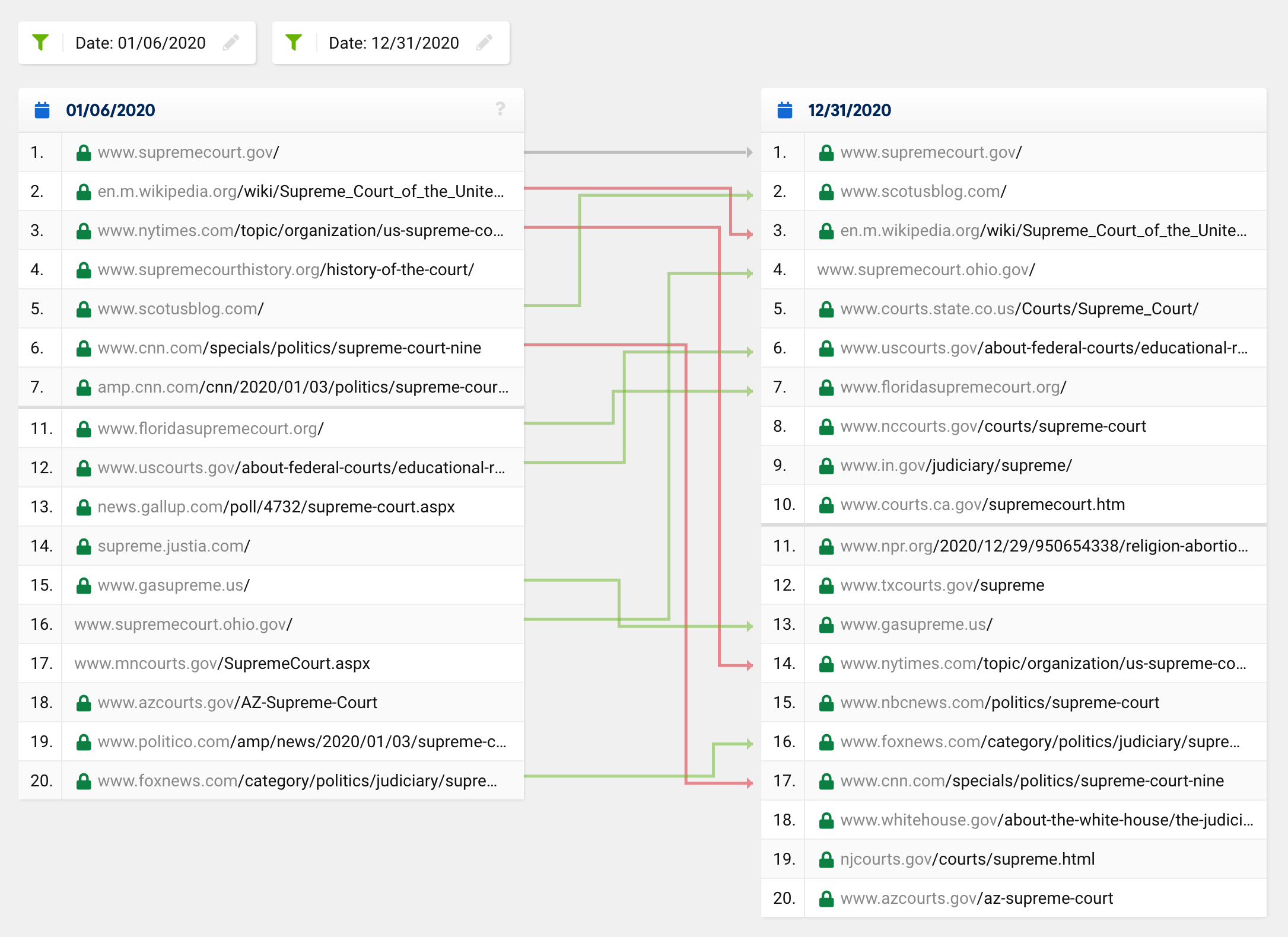
While News sites may have seen declines in SEO visibility, this may have been mitigated by organic traffic from other sources. In 2020, news traffic and search volumes increased considerably due to COVID-19, as well as increases in traffic and usage of Google Discover, which could be hiding the losses in visibility.
Website migrations
In some cases, large drops in visibility can be explained by site migrations or companies merging or consolidating with other brands. For example, homeaway.com merged into vrbo.com and absorbed its visibility.
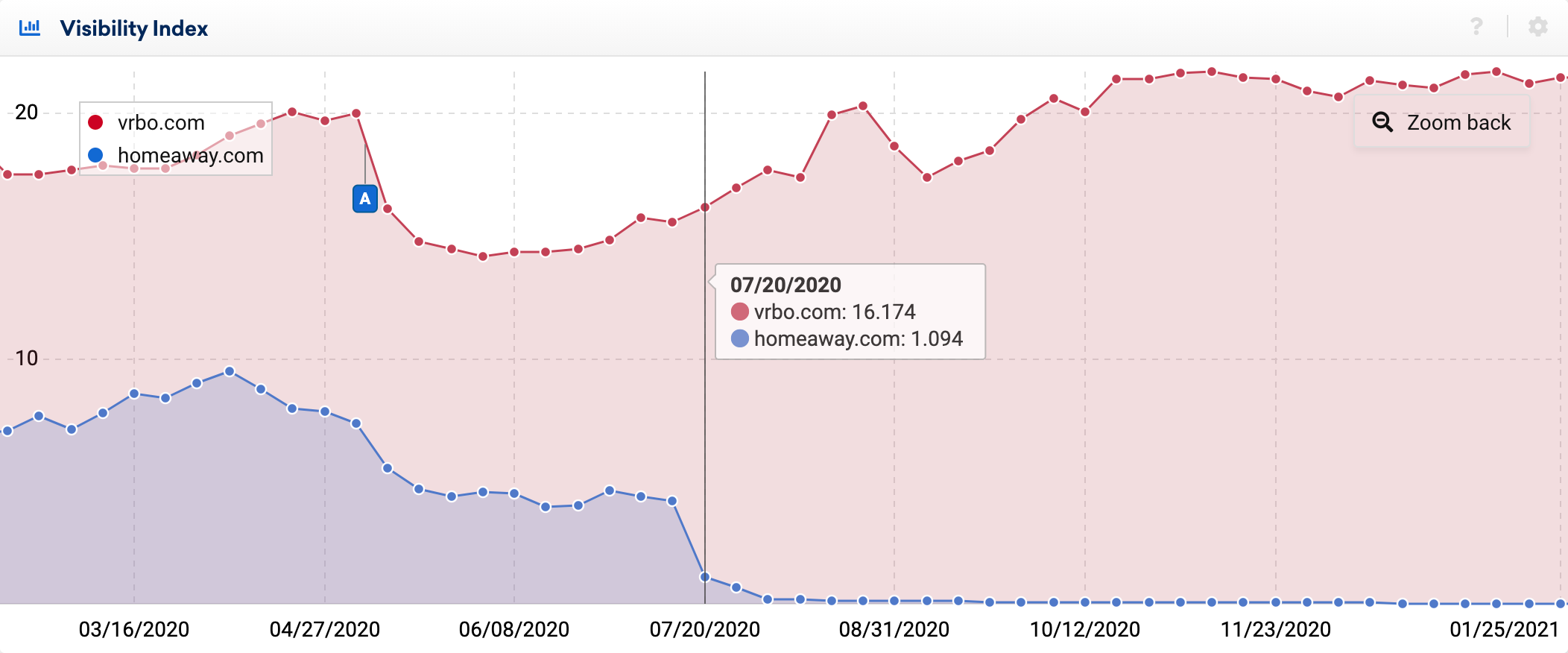
Another example is The Wirecutter, which previously held its own domain that was merged into the nytimes.com domain. The domain spanishcentral.com was also migrated to a subfolder of nglish.com.
Changes in SERP Display/Features
Google continuously updates how it displays Twitter cards and video panels, which account for the loss in visibility for the domains youtube.com (-1,004.27) and twitter.com (-541.73). The sites did not actually lose visibility; but their links were often repurposed into new formats within the search results, such as carousels that display tweets from Twitter or video thumbnails. Those carousels are tracked as separate domains in Sistrix: twitter.universal-search-box.com and video.universal-search-box.com, as are any features that fall into Google’s Universal Search results.
Dictionary Websites
A variety of dictionary sites were among the biggest visibility losers, such as urbandictionary.com (-158.32), macmillandictionary.com (-98.81), merriam-webster.com (-87.53), and vocabulary.com (-53.81). It is worth noting that Google updated its Quality Rater Guidelines in October of 2020, which specifically included an update related to dictionary websites.
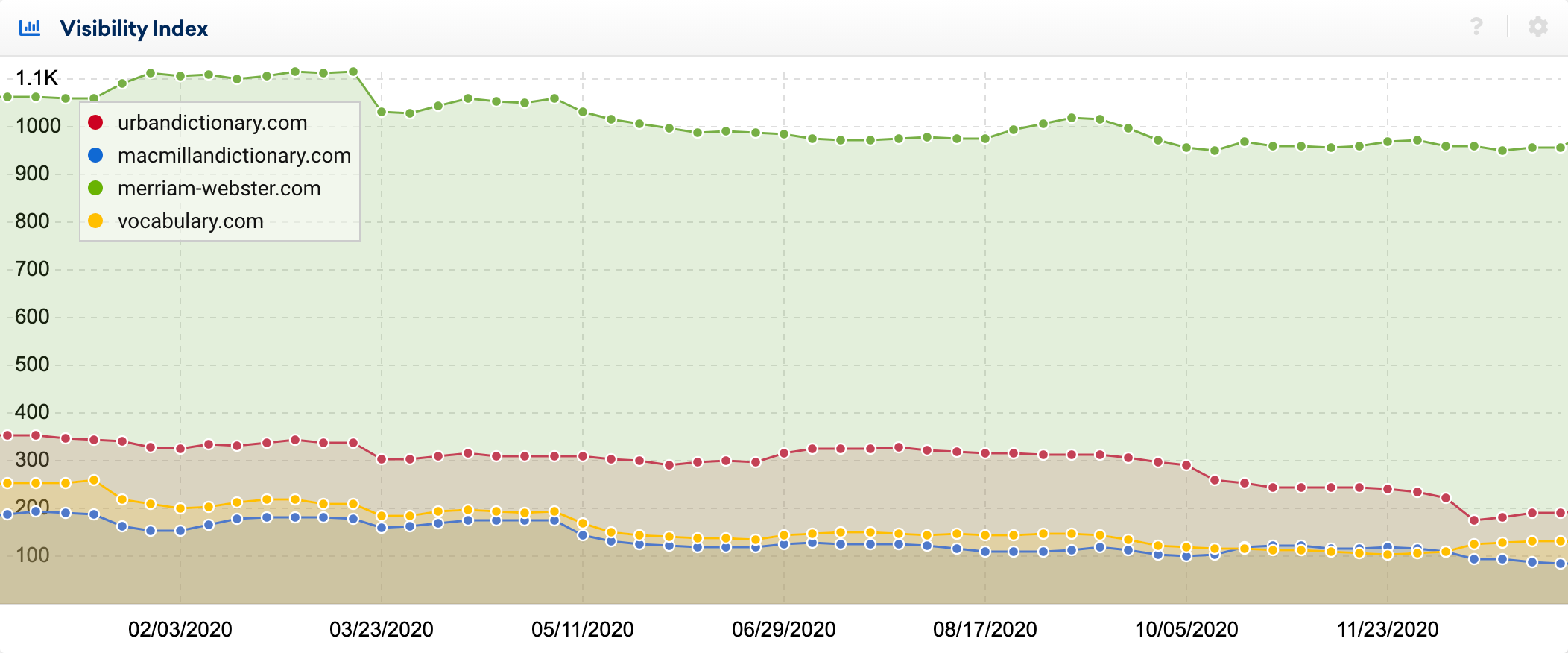
Google instructs its quality raters to pay attention to intent, and only rate dictionary results as meeting the needs of users when users type certain words that would indicate they are most likely looking for a definition. Conversely, Google indicates that quality raters should consider when queries are words most people understand, such as “rainbow,” which wouldn’t benefit from showing dictionary results. In this case, a picture or a simple description would better meet user intent.
Google’s quality raters don’t directly affect the algorithm, but it’s possible that the feedback they provided as a result of these updates to the guidelines ultimately played out in changes to the performance of dictionary websites. The sites didn’t do anything wrong, but Google’s algorithms may have determined they aren’t the best sites to meet the intent of users for various keywords they used to rank well for.
People Finders
There are two domains in the ‘greatest percentage lost’ category that serve to provide users with personal information about other people, such as their criminal records, social media information, mugshots, police records, and more. These are peoplefinders.com and peoplefinder.com, which lost -93.63% and -87.36% of their visibility throughout 2020. The majority of these declines took place during the January and May Core Updates.
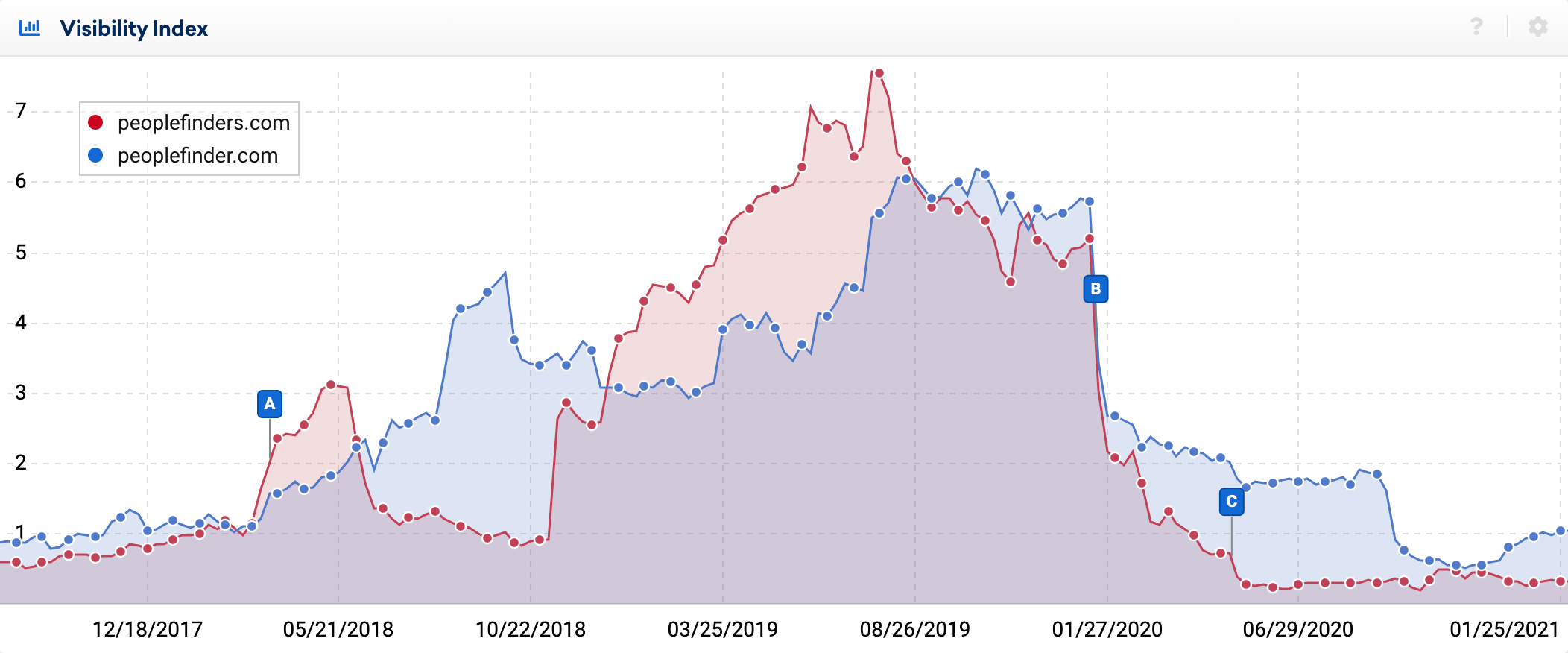
While this may or may not be related, it’s worth noting a similar situation that took place with a website called mylife.com, which supposedly requires users to pay to remove confidential information about themselves from its site.
Upon receiving complaints about this site, Danny Sullivan from Google reminded users that they could submit these types of pages to be removed from Google. It may be possible that some of the visibility declines affecting peoplefinder.com and peoplefinders.com could have been a result of some of these pages falling out of the search results.
In fact, there are some related concerns listed among the sites’ BBB profiles, which is something Google tells its quality raters to pay attention to when analyzing a sites’ perceived E-A-T (expertise, authoritativeness, and trustworthiness).
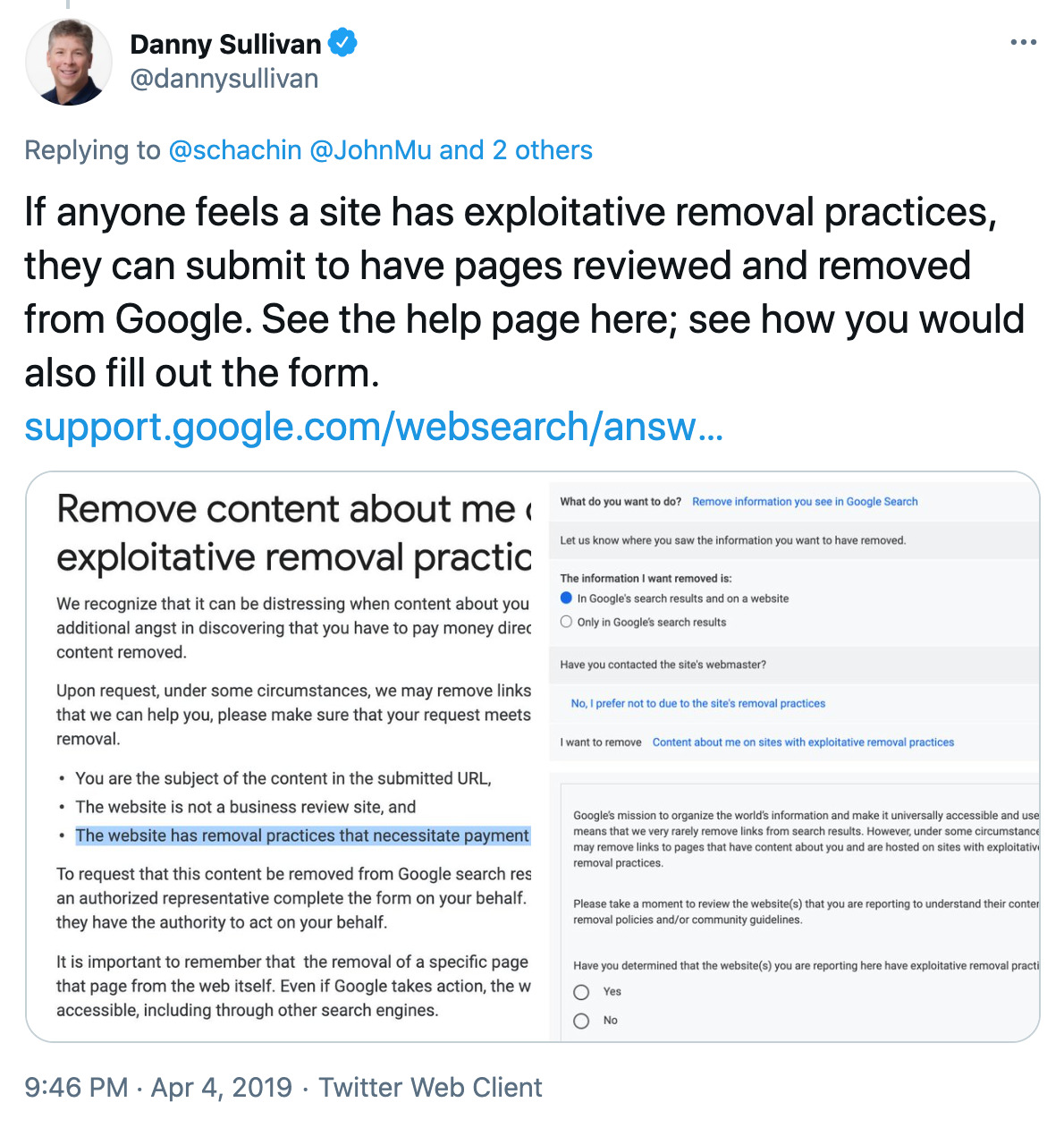
Google Competitors Losing Visibility
There are few sites that could potentially be classified as competitors to Google itself, with its various products that may appear in the search results.
For one, yelp.com lost -49.79 visibility points. While this could have been due to a variety of factors, and may have also been a result of changing user intent due to coronavirus, it’s worth noting that Yelp is a major competitor to Google My Business.
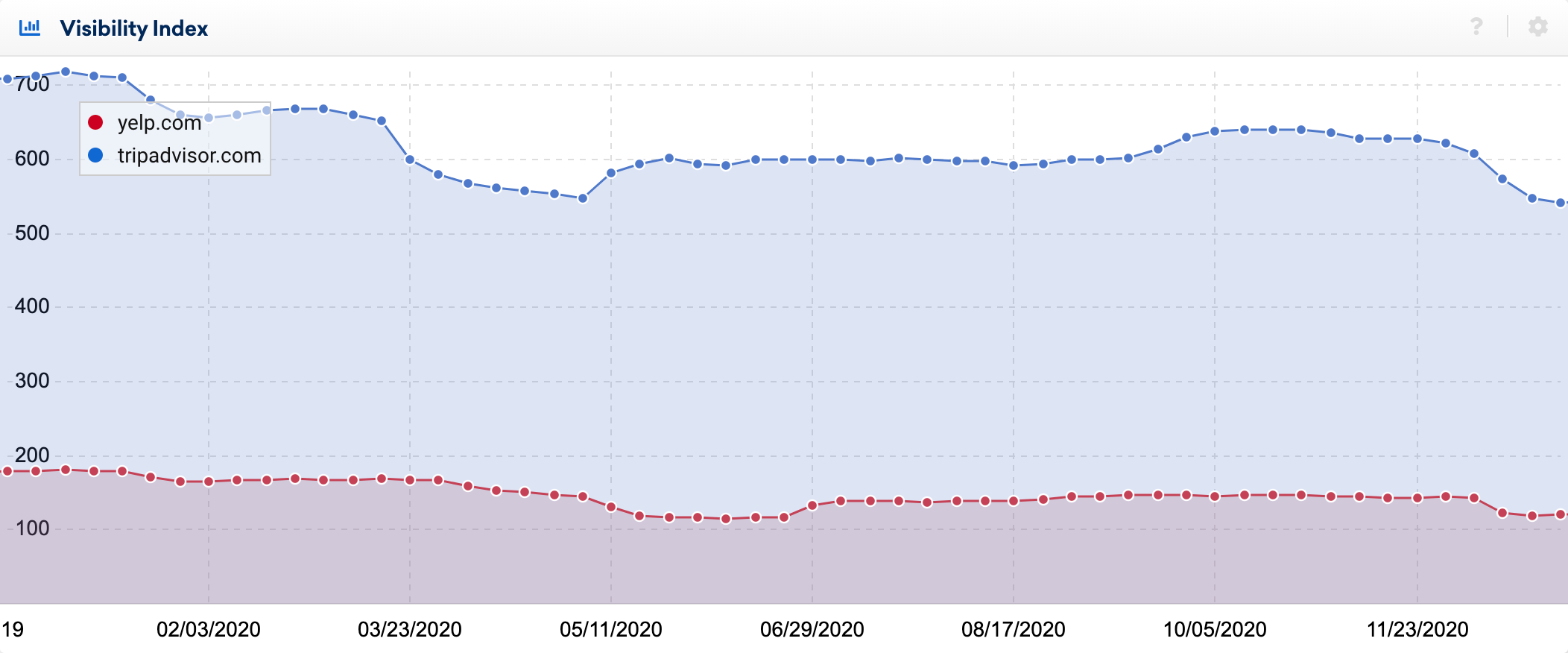
Similarly, tripadvisor.com, which lost -118.37 visibility points, may have seen these declines in large part due to searchers’ inability to travel throughout 2020, which could have resulted in visibility declines. But it is also the case that TripAdvisor competes with various Google properties, such as Google Flights, Google Trips, and Google Hotels, which could also provide some explanation as to why its visibility declined throughout the year.
However, both yelp.com and tripadvisor.com have a fake reviews problem that need to be considered too.
Copyright infringement
A look at Google’s Transparency Report for freemusicdownloads.com reveals that copyright holders are very active in reporting infringements. It does not matter how much effort you invest in SEO; if your business model is build on content you do not own or did not licence, sooner or later, Google will start to remove your content:
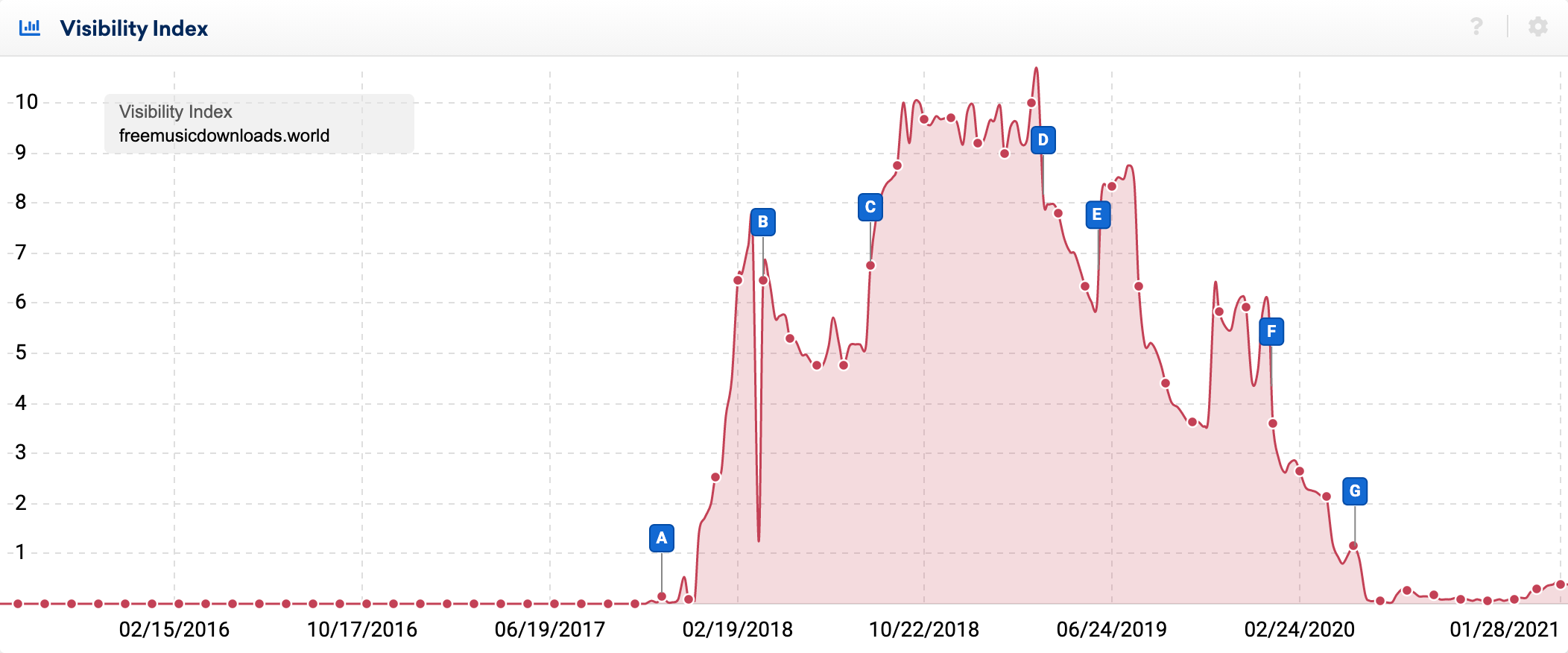
E-A-T
E-A-T – expertise, authoritativeness, and trustworthiness – continued to play a major role in the visibility of websites on Google in 2020, but was given even more importance in light of the coronavirus pandemic. For many queries related to COVID-19, Google’s algorithms adjusted to surface content from the most highly authoritative health and government institutions, such as the CDC, FDA, WHO, and more.
The result of this is that some of the biggest health publishers, such as webmd.com and medicalnewstoday.com made it onto the biggest losers of total visibility.
This is not because the sites necessarily did anything wrong; but because Google’s algorithms adjusted greatly throughout 2020 to rank high-authority health institutions in top positions for a variety of health-related queries. People Also Ask boxes also saw big increases for many medical and other YMYL (your money, your life) queries that pushed down health publisher websites. Sometimes the drop was only just one or two positions, but this can cause big decreases in visibility at scale for very high-volume keywords.
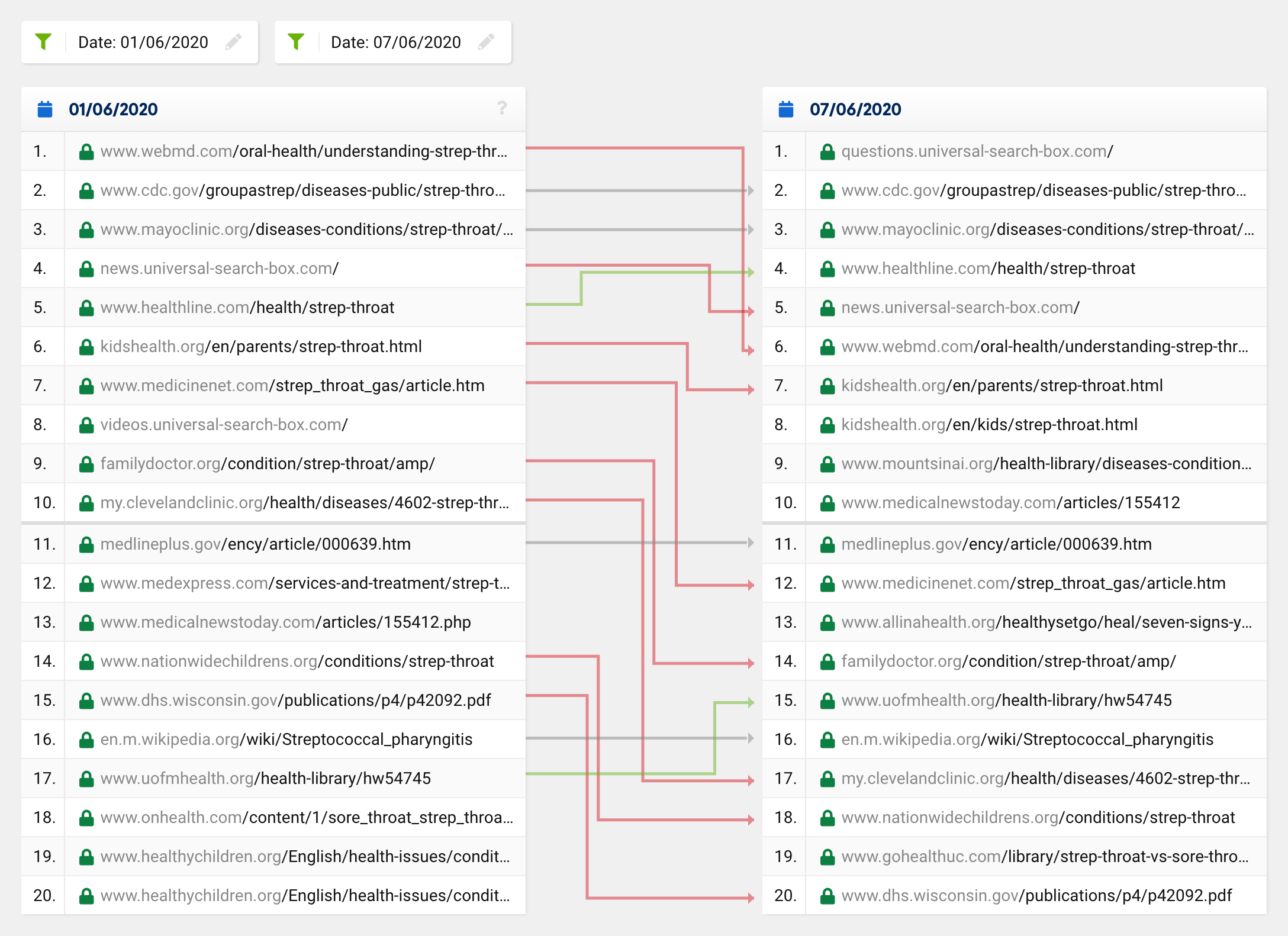
This is an example of the changes seen for the query “strep throat,” which Google likely considered a query related to COVID-19. Webmd.com had been ranking in position #1 during January of 2020, but by July, it was pushed to position 6, as Google’s People Also Ask box and the CDC result earned top positions.
| Domain | 30.12.2019 | 28.12.2020 | Absolute Change |
|---|---|---|---|
| youtube.com | 2,070.86 | 1,066.59 | -1,004.27 |
| wikipedia.org | 6,486.09 | 5,588.88 | -897.21 |
| twitter.com | 763.70 | 221.97 | -541.73 |
| google.com | 949.12 | 522.17 | -426.96 |
| wiktionary.org | 798.35 | 374.67 | -423.68 |
| urbandictionary.com | 378.42 | 220.10 | -158.32 |
| tripadvisor.com | 662.07 | 543.69 | -118.37 |
| bestbuy.com | 460.09 | 348.92 | -111.18 |
| macmillandictionary.com | 195.90 | 97.09 | -98.81 |
| theguardian.com | 223.22 | 133.74 | -89.48 |
| merriam-webster.com | 1,063.42 | 975.89 | -87.53 |
| howstuffworks.com | 90.77 | 32.61 | -58.16 |
| ldoceonline.com | 99.05 | 43.42 | -55.63 |
| vocabulary.com | 203.76 | 149.95 | -53.81 |
| cnn.com | 159.69 | 107.00 | -52.69 |
| webmd.com | 279.38 | 226.89 | -52.49 |
| yelp.com | 171.27 | 121.48 | -49.79 |
| forbes.com | 145.20 | 95.42 | -49.78 |
| office.com | 59.98 | 13.93 | -46.06 |
| spotify.com | 162.03 | 116.01 | -46.02 |
We’ve also prepared the full list of 100 entries in a Google Sheet. View 100 absolute losers in a Google Sheet.
Declines in Visibility are Not Always a Result of Bad SEO
It is important to remember that many of the losers above did not do anything in particular that resulted in organic visibility declines. Google’s algorithms are adjusted both by deliberate actions (algorithm updates) and other natural features of its algorithms, such as QDF (Query Deserves Freshness), which aims to provide users with the most relevant results to match their specific intent. As user intent changes, which took place on a major scale throughout the coronavirus pandemic, Google’s results naturally update to reflect that, which resulted in many of the visibility declines shown above.
In Memoriam
“Hamlet Batista has passed away. He was a great, humble and pioneer SEO, also a good friend to the author of this article, Lily Ray, “su hermana”. Our condolences to his family. You will find a tribute to Hamlet by Lily on SEJ. You can also be a part of the raising money to help support his family on gofundme.
Thank you Lily for everything you have done for Hamlet and his family.”
Your friends at SISTRIX.


